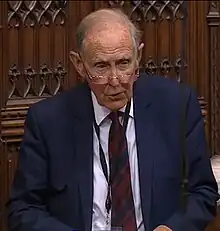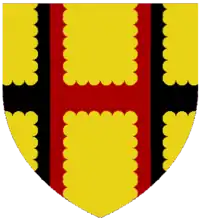The Lord Brooke of Sutton Mandeville | |
|---|---|
 Brooke in his valediction, 2015 | |
| Secretary of State for National Heritage | |
| In office 22 September 1992 – 20 July 1994 | |
| Prime Minister | John Major |
| Preceded by | David Mellor |
| Succeeded by | Stephen Dorrell |
| Secretary of State for Northern Ireland | |
| In office 24 July 1989 – 10 April 1992 | |
| Prime Minister | |
| Preceded by | Tom King |
| Succeeded by | Patrick Mayhew |
| Paymaster General | |
| In office 13 July 1987 – 24 July 1989 | |
| Prime Minister | Margaret Thatcher |
| Preceded by | Kenneth Clarke |
| Succeeded by | The Earl of Caithness |
| Chairman of the Conservative Party | |
| In office 13 July 1987 – 24 July 1989 | |
| Prime Minister | Margaret Thatcher |
| Preceded by | Norman Tebbit |
| Succeeded by | Kenneth Baker |
| Member of Parliament for Cities of London and Westminster | |
| In office 24 February 1977 – 14 May 2001 | |
| Preceded by | Christopher Tugendhat |
| Succeeded by | Mark Field |
| Personal details | |
| Born | Peter Leonard Brooke 3 March 1934 London, England |
| Died | 13 May 2023 (aged 89) Tisbury, Wiltshire, England |
| Political party | Conservative |
| Spouses |
|
| Children | 4 |
| Alma mater | |
Peter Leonard Brooke, Baron Brooke of Sutton Mandeville, CH, PC (3 March 1934 – 13 May 2023) was a British politician. A member of the Conservative Party, he served in the Cabinet under prime ministers Margaret Thatcher and John Major, and was a member of Parliament (MP) representing the Cities of London and Westminster from 1977 to 2001.
Early life
Brooke was born in London, the son of Henry Brooke, the onetime Home Secretary, and Barbara Brooke.[1][2] His parents were one of the few married couples where both partners held noble titles in their own right. His younger brother was the judge Sir Henry Brooke.[3] He was educated at Marlborough College and Balliol College, Oxford, (where he was President of the Oxford Union) before going on to the Harvard Business School in the United States.[1] After leaving university he worked as a headhunter and was Chairman of Spencer Stuart.[4]
Parliamentary career
After unsuccessfully challenging Neil Kinnock at the Labour stronghold of Bedwellty in October 1974, he was elected as MP for the Cities of London and Westminster in a by-election in 1977. He was sworn into the Privy council in 1988. He was made Chairman of the Conservative Party in 1987, and then Secretary of State for Northern Ireland in 1989. His speech, made in November 1990 in London, is largely credited with bringing Sinn Féin to the negotiating table, in which he declared that Britain had no "selfish strategic or economic interest" in Northern Ireland and would accept unification, if the people wished it.[5]
In January 1992, Brooke appeared on the Irish chat show, The Late Late Show. After a pleasant interview, the presenter, Gay Byrne, coaxed and goaded the unwilling Brooke into singing "Oh My Darling, Clementine", on a day when seven Protestant construction workers had been killed by an IRA bomb. Many unionists were outraged at what seemed to be a moment clearly out of touch with grieving families, and requested the resignation of Brooke.[6] The incident was a factor in Brooke's being dropped from his position after the April 1992 general election, although Brooke claimed he had offered his resignation after the incident.[7]
After leaving the Cabinet, Brooke stood unsuccessfully for the position of Speaker of the House of Commons. The House instead elected the Labour MP Betty Boothroyd to the role, with several Conservative MPs voting against Brooke on the grounds that he had too recently been in the Cabinet and was thus insufficiently close to the backbenches. Brooke then remained on the backbenches for a short time, before being brought back into the Cabinet later in the year as Secretary of State for National Heritage, a role he held until 1994. During his time as Heritage Secretary, he oversaw the restoration of Windsor Castle following the fire that had struck the State Apartments in 1992.
Later life
Brooke stepped down as an MP at the 2001 general election and was created a life peer as Baron Brooke of Sutton Mandeville, of Sutton Mandeville in the County of Wiltshire, on 30 July 2001.[8] He was Chairman of the Association of Conservative Peers. He was appointed Member of the Order of the Companions of Honour, as his father had been, in 1992.[1] He retired from the House of Lords in September 2015.[4]
Personal life and death
In 1964, Brooke married Joan Smith; they had four sons, one of whom died as an infant, and were married until her death in 1985, from complications of a surgical procedure.[2] He married Lindsay Allinson in 1991.[2]
Brooke died in Tisbury, Wiltshire, on 13 May 2023, at the age of 89.[9]
Coat of arms
  |
|
References
- 1 2 3 "Brooke of Sutton Mandeville, Baron, (Peter Leonard Brooke) (born 3 March 1934)". WHO'S WHO & WHO WAS WHO. 2007. doi:10.1093/ww/9780199540884.013.u8873. ISBN 978-0-19-954088-4. Retrieved 12 June 2021.
- 1 2 3 Bates, Stephen (15 May 2023). "Lord Brooke of Sutton Mandeville obituary". Retrieved 28 May 2023.
- ↑ The Guardian, obituary of Henry Brooke
- 1 2 "Lord Brooke of Sutton Mandeville, Conservative Northern Ireland Secretary noted for his decency – obituary". The Daily Telegraph. 15 May 2023. Retrieved 15 May 2023.
- ↑ "Timeline: Northern Ireland's road to peace". 27 January 2006. Retrieved 23 October 2019.
- ↑ Coogan, Tim Pat (2002). The troubles: Ireland's ordeal, 1966-1996, and the search for peace. Palgrave Macmillan. p. 239. ISBN 0-312-29418-2.
- ↑ Brooke / Mayhew Talks (April 1991 to November 1992) – A Chronology of Main Events, CAIN Web Service, University of Ulster
- ↑ "No. 56292". The London Gazette. 2 August 2001. p. 9151.
- ↑ Gibbons, Amy (15 May 2023). "Lord Brooke, Thatcher cabinet minister, dies aged 89". The Daily Telegraph. Retrieved 28 May 2023.
- ↑ Debrett's Peerage. 2019. p. 1861.
_(2022).svg.png.webp)
.svg.png.webp)